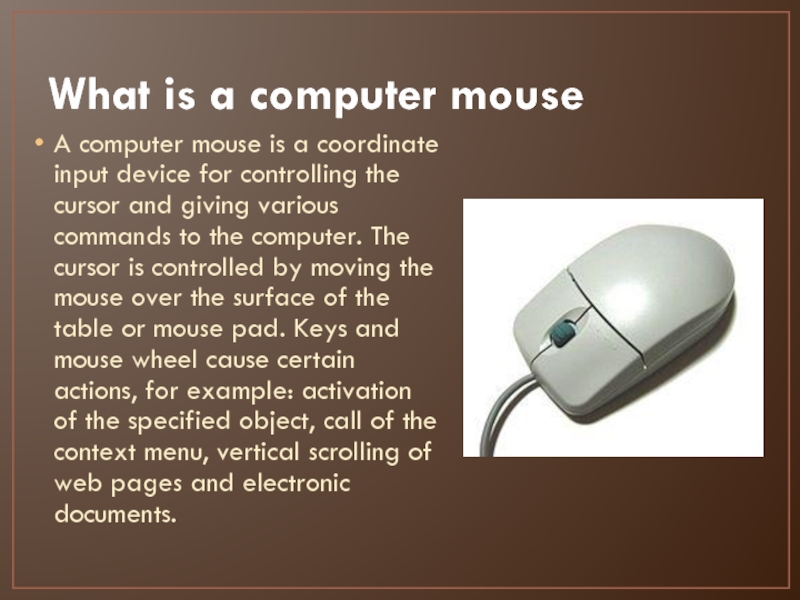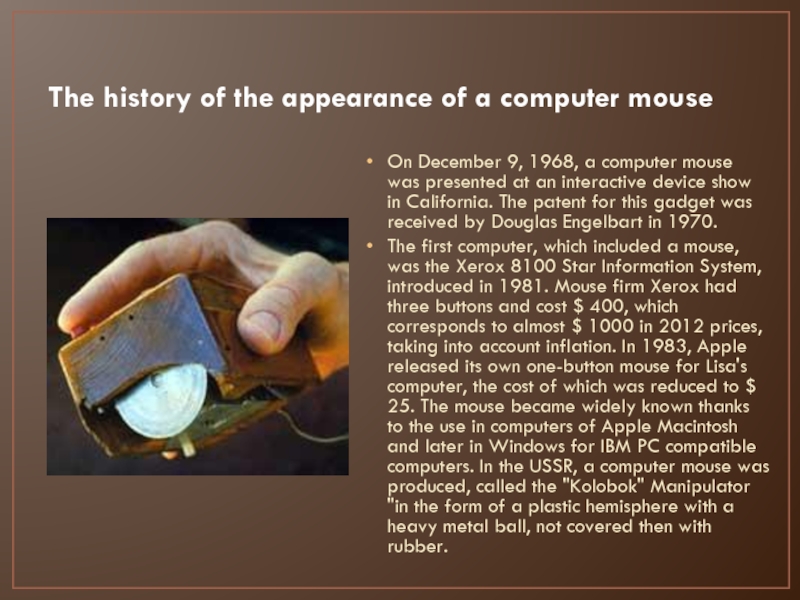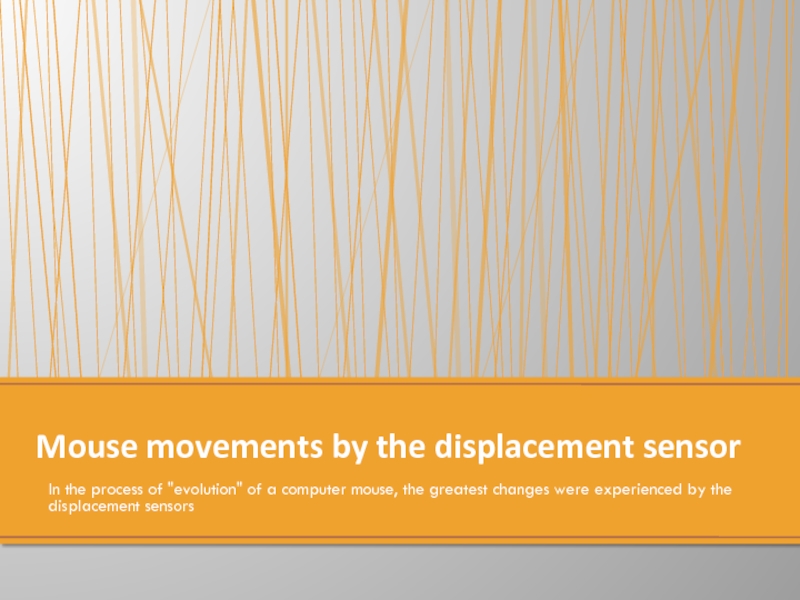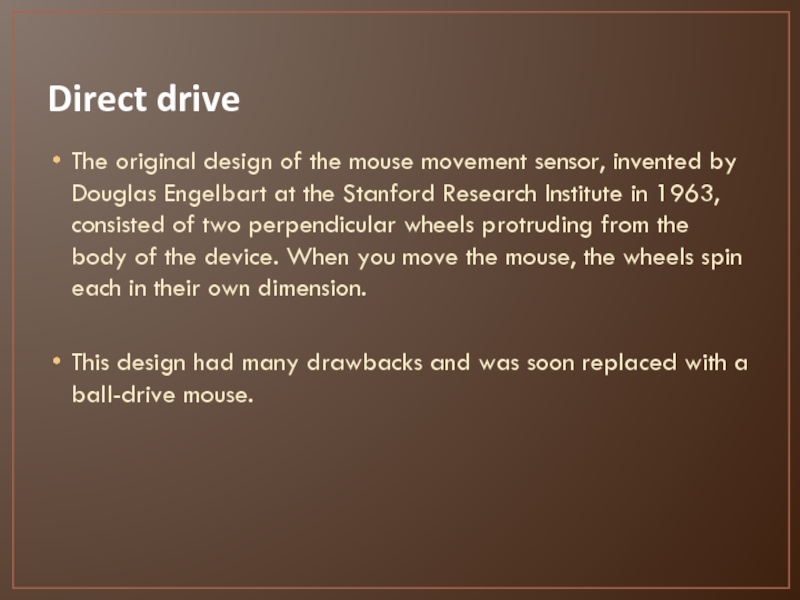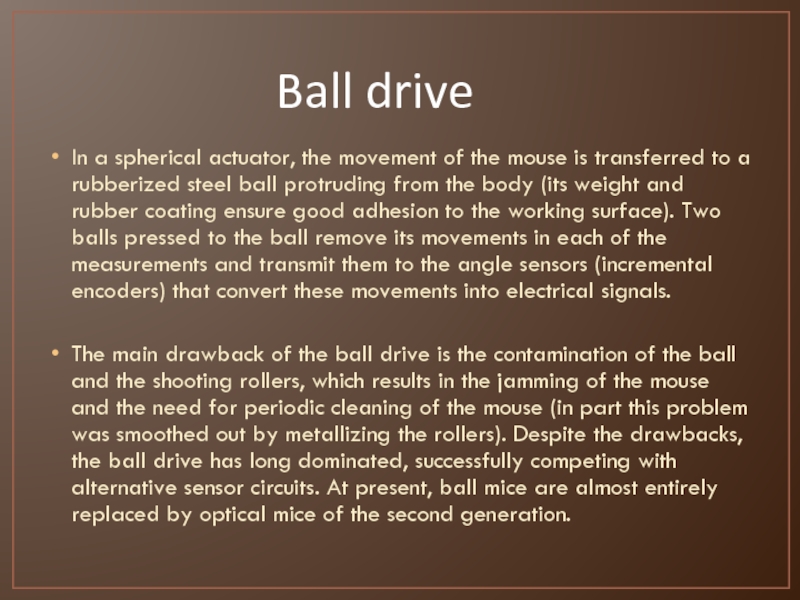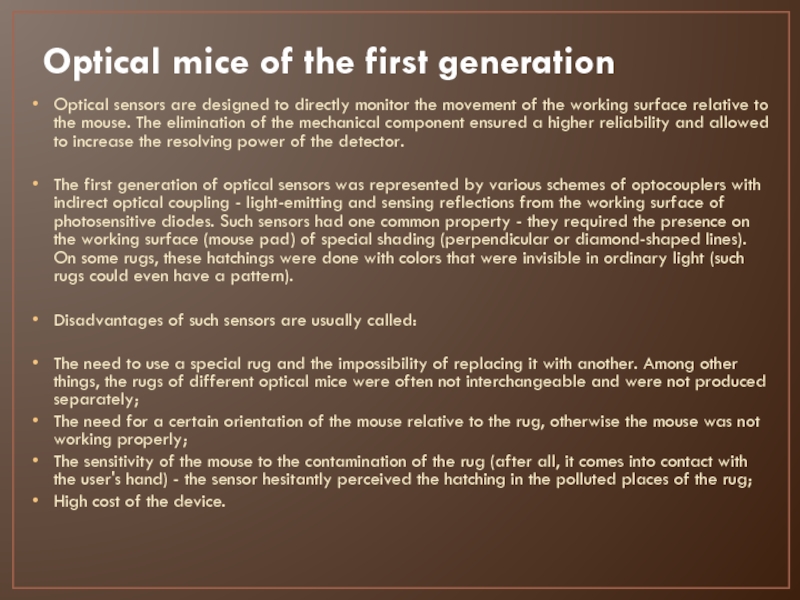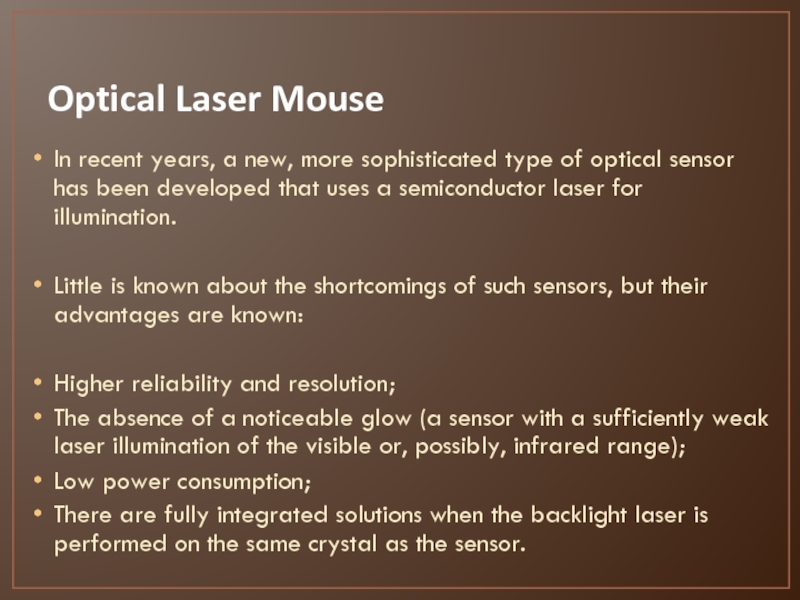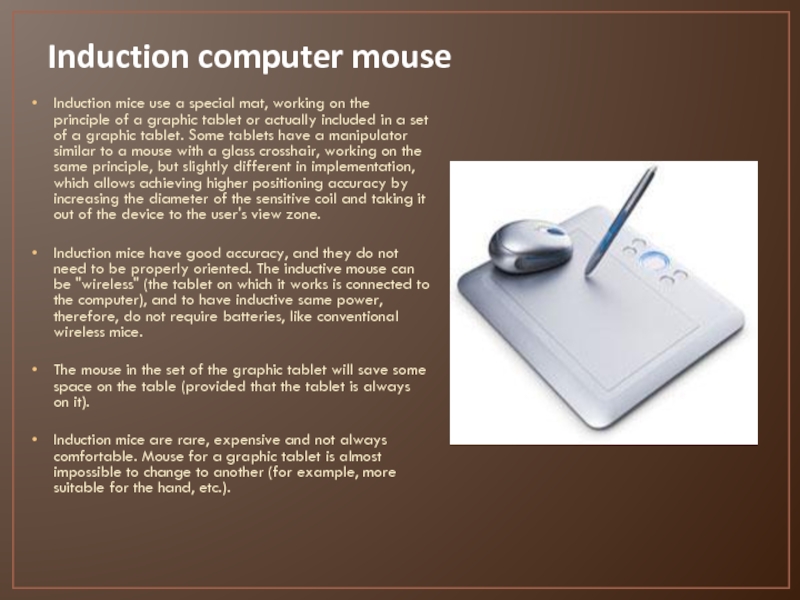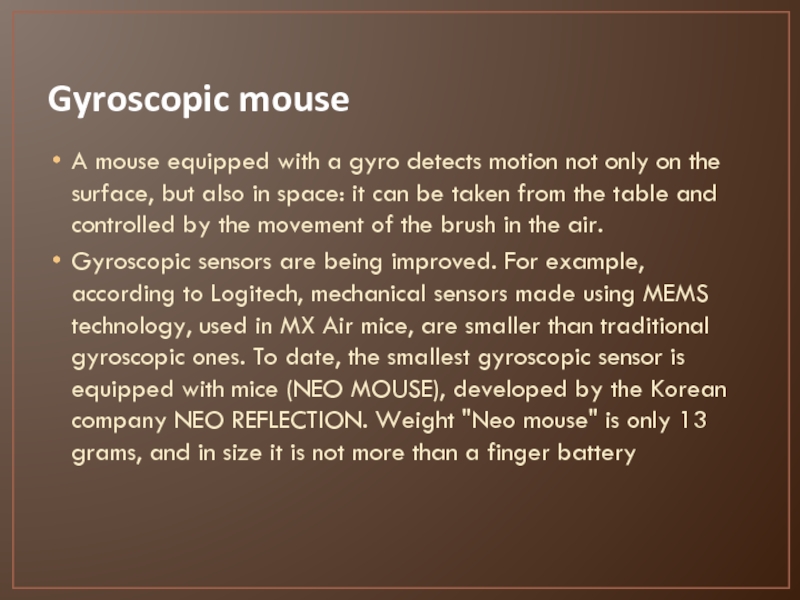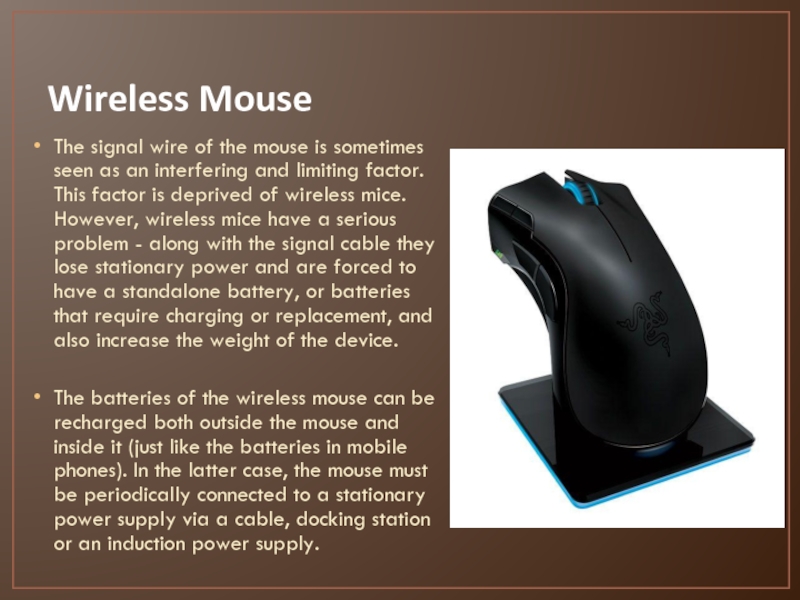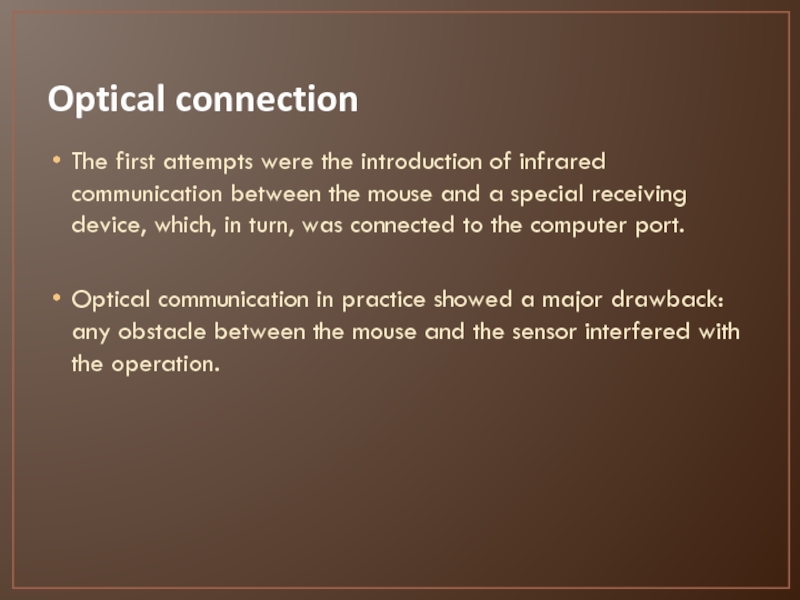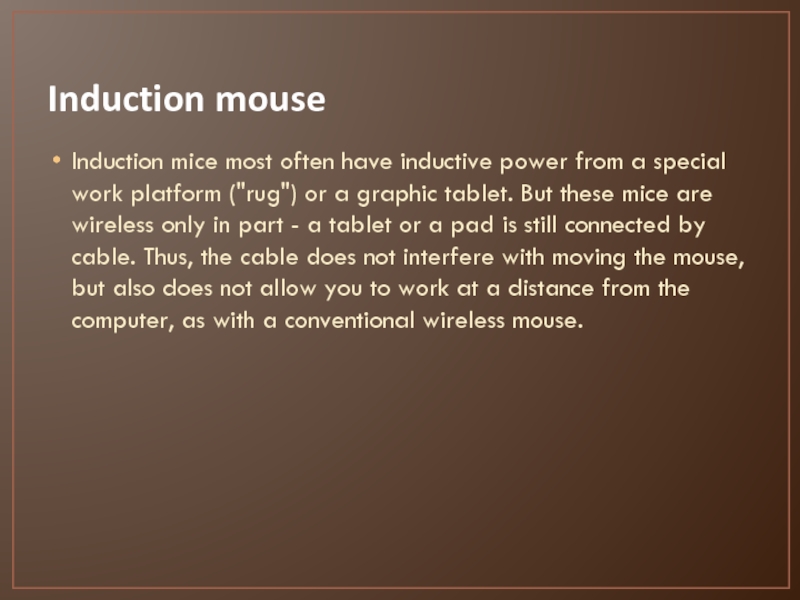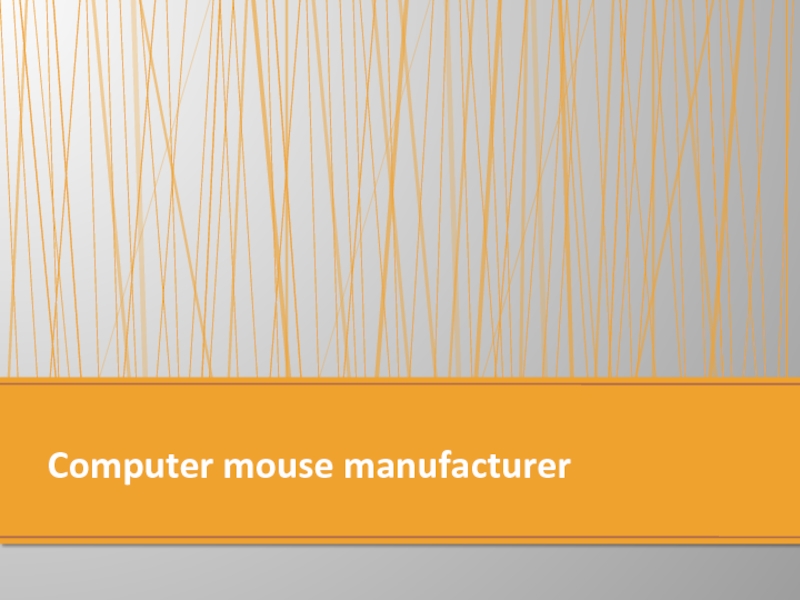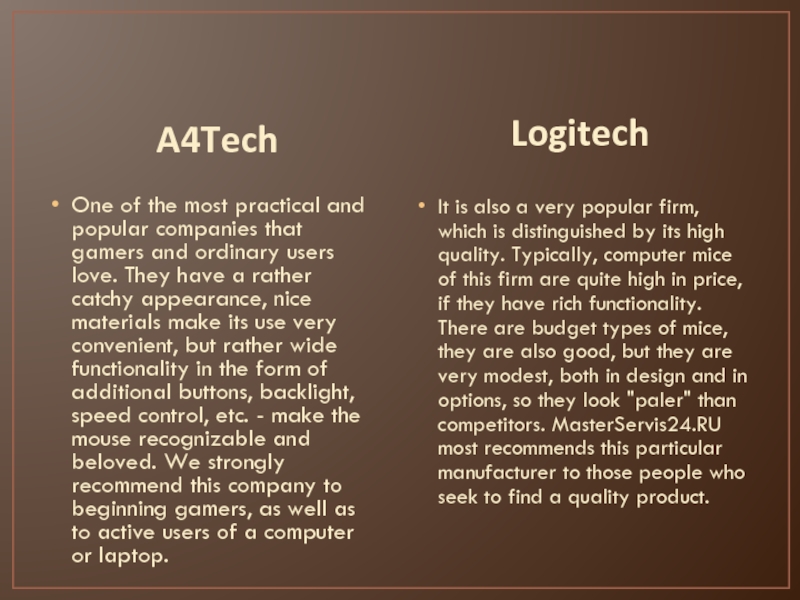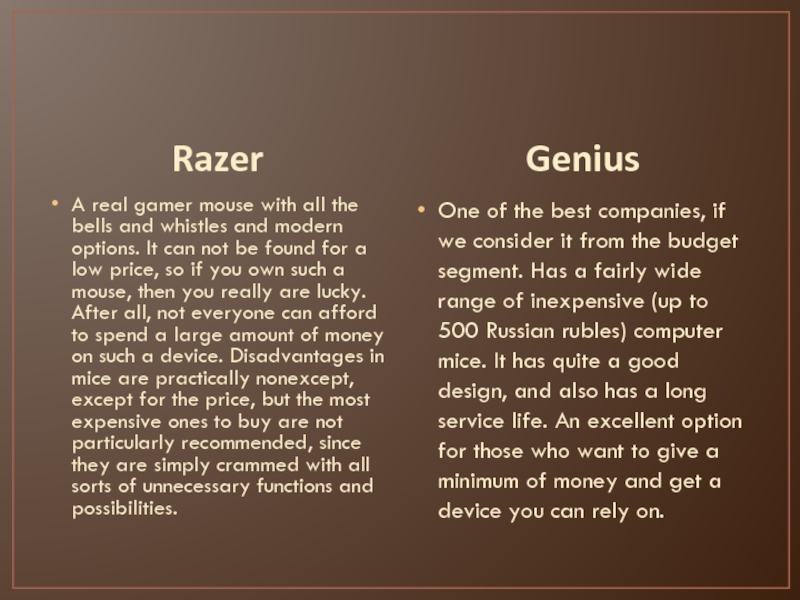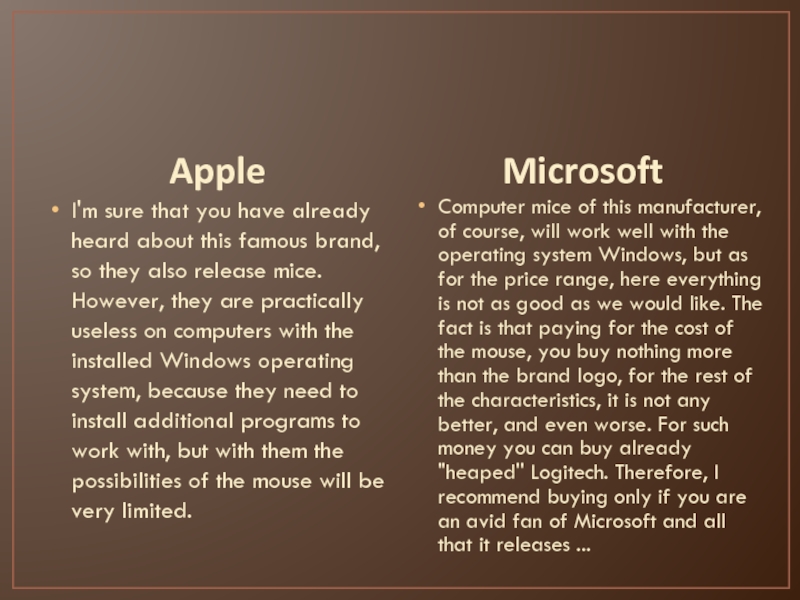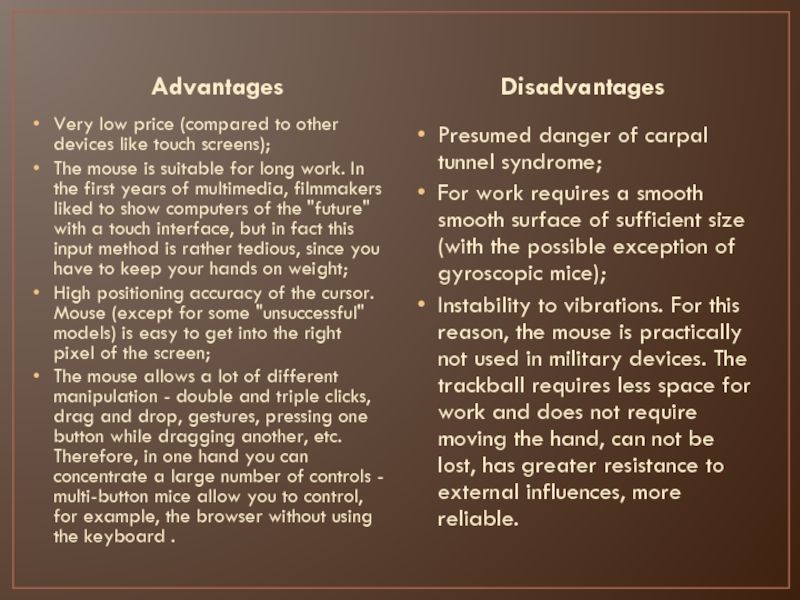Разделы презентаций
- Разное
- Английский язык
- Астрономия
- Алгебра
- Биология
- География
- Геометрия
- Детские презентации
- Информатика
- История
- Литература
- Математика
- Медицина
- Менеджмент
- Музыка
- МХК
- Немецкий язык
- ОБЖ
- Обществознание
- Окружающий мир
- Педагогика
- Русский язык
- Технология
- Физика
- Философия
- Химия
- Шаблоны, картинки для презентаций
- Экология
- Экономика
- Юриспруденция
Computer Mouse
Содержание
- 1. Computer Mouse
- 2. What is a computer mouseA computer mouse
- 3. The history of the appearance of a
- 4. In the process of "evolution"
- 5. Direct driveThe original design of the mouse
- 6. Ball driveIn a spherical actuator,
- 7. Optical mice of the first generationOptical sensors
- 8. Optical Laser MouseIn recent years, a new,
- 9. Induction computer mouseInduction mice use a special
- 10. Gyroscopic mouseA mouse equipped with a gyro
- 11. Interface connection
- 12. Wireless MouseThe signal wire of the mouse
- 13. Optical connectionThe first attempts were the introduction
- 14. Induction mouseInduction mice most often have inductive
- 15. Computer mouse manufacturer
- 16. A4TechOne of the most practical and popular
- 17. RazerA real gamer mouse with all the
- 18. AppleI'm sure that you have already heard
- 19. Advantages and disadvantages of computer mouse
- 20. AdvantagesVery low price (compared to other devices
- 21. Thank you for attention!
- 22. Скачать презентанцию
Слайды и текст этой презентации
Слайд 3The history of the appearance of a computer mouse
On December
9, 1968, a computer mouse was presented at an interactive
device show in California. The patent for this gadget was received by Douglas Engelbart in 1970.The first computer, which included a mouse, was the Xerox 8100 Star Information System, introduced in 1981. Mouse firm Xerox had three buttons and cost $ 400, which corresponds to almost $ 1000 in 2012 prices, taking into account inflation. In 1983, Apple released its own one-button mouse for Lisa's computer, the cost of which was reduced to $ 25. The mouse became widely known thanks to the use in computers of Apple Macintosh and later in Windows for IBM PC compatible computers. In the USSR, a computer mouse was produced, called the "Kolobok" Manipulator "in the form of a plastic hemisphere with a heavy metal ball, not covered then with rubber.
Слайд 4
In the process of "evolution" of a computer mouse, the
greatest changes were experienced by the displacement sensors
Mouse movements by
the displacement sensorСлайд 5Direct drive
The original design of the mouse movement sensor, invented
by Douglas Engelbart at the Stanford Research Institute in 1963,
consisted of two perpendicular wheels protruding from the body of the device. When you move the mouse, the wheels spin each in their own dimension.This design had many drawbacks and was soon replaced with a ball-drive mouse.
Слайд 6
Ball drive
In a spherical actuator, the movement of the mouse
is transferred to a rubberized steel ball protruding from the
body (its weight and rubber coating ensure good adhesion to the working surface). Two balls pressed to the ball remove its movements in each of the measurements and transmit them to the angle sensors (incremental encoders) that convert these movements into electrical signals.The main drawback of the ball drive is the contamination of the ball and the shooting rollers, which results in the jamming of the mouse and the need for periodic cleaning of the mouse (in part this problem was smoothed out by metallizing the rollers). Despite the drawbacks, the ball drive has long dominated, successfully competing with alternative sensor circuits. At present, ball mice are almost entirely replaced by optical mice of the second generation.
Слайд 7Optical mice of the first generation
Optical sensors are designed to
directly monitor the movement of the working surface relative to
the mouse. The elimination of the mechanical component ensured a higher reliability and allowed to increase the resolving power of the detector.The first generation of optical sensors was represented by various schemes of optocouplers with indirect optical coupling - light-emitting and sensing reflections from the working surface of photosensitive diodes. Such sensors had one common property - they required the presence on the working surface (mouse pad) of special shading (perpendicular or diamond-shaped lines). On some rugs, these hatchings were done with colors that were invisible in ordinary light (such rugs could even have a pattern).
Disadvantages of such sensors are usually called:
The need to use a special rug and the impossibility of replacing it with another. Among other things, the rugs of different optical mice were often not interchangeable and were not produced separately;
The need for a certain orientation of the mouse relative to the rug, otherwise the mouse was not working properly;
The sensitivity of the mouse to the contamination of the rug (after all, it comes into contact with the user's hand) - the sensor hesitantly perceived the hatching in the polluted places of the rug;
High cost of the device.
Слайд 8Optical Laser Mouse
In recent years, a new, more sophisticated type
of optical sensor has been developed that uses a semiconductor
laser for illumination.Little is known about the shortcomings of such sensors, but their advantages are known:
Higher reliability and resolution;
The absence of a noticeable glow (a sensor with a sufficiently weak laser illumination of the visible or, possibly, infrared range);
Low power consumption;
There are fully integrated solutions when the backlight laser is performed on the same crystal as the sensor.
Слайд 9Induction computer mouse
Induction mice use a special mat, working on
the principle of a graphic tablet or actually included in
a set of a graphic tablet. Some tablets have a manipulator similar to a mouse with a glass crosshair, working on the same principle, but slightly different in implementation, which allows achieving higher positioning accuracy by increasing the diameter of the sensitive coil and taking it out of the device to the user's view zone.Induction mice have good accuracy, and they do not need to be properly oriented. The inductive mouse can be "wireless" (the tablet on which it works is connected to the computer), and to have inductive same power, therefore, do not require batteries, like conventional wireless mice.
The mouse in the set of the graphic tablet will save some space on the table (provided that the tablet is always on it).
Induction mice are rare, expensive and not always comfortable. Mouse for a graphic tablet is almost impossible to change to another (for example, more suitable for the hand, etc.).
Слайд 10Gyroscopic mouse
A mouse equipped with a gyro detects motion not
only on the surface, but also in space: it can
be taken from the table and controlled by the movement of the brush in the air.Gyroscopic sensors are being improved. For example, according to Logitech, mechanical sensors made using MEMS technology, used in MX Air mice, are smaller than traditional gyroscopic ones. To date, the smallest gyroscopic sensor is equipped with mice (NEO MOUSE), developed by the Korean company NEO REFLECTION. Weight "Neo mouse" is only 13 grams, and in size it is not more than a finger battery
Слайд 12Wireless Mouse
The signal wire of the mouse is sometimes seen
as an interfering and limiting factor. This factor is deprived
of wireless mice. However, wireless mice have a serious problem - along with the signal cable they lose stationary power and are forced to have a standalone battery, or batteries that require charging or replacement, and also increase the weight of the device.The batteries of the wireless mouse can be recharged both outside the mouse and inside it (just like the batteries in mobile phones). In the latter case, the mouse must be periodically connected to a stationary power supply via a cable, docking station or an induction power supply.
Слайд 13Optical connection
The first attempts were the introduction of infrared communication
between the mouse and a special receiving device, which, in
turn, was connected to the computer port.Optical communication in practice showed a major drawback: any obstacle between the mouse and the sensor interfered with the operation.
Слайд 14Induction mouse
Induction mice most often have inductive power from a
special work platform ("rug") or a graphic tablet. But these
mice are wireless only in part - a tablet or a pad is still connected by cable. Thus, the cable does not interfere with moving the mouse, but also does not allow you to work at a distance from the computer, as with a conventional wireless mouse.Слайд 16A4Tech
One of the most practical and popular companies that gamers
and ordinary users love. They have a rather catchy appearance,
nice materials make its use very convenient, but rather wide functionality in the form of additional buttons, backlight, speed control, etc. - make the mouse recognizable and beloved. We strongly recommend this company to beginning gamers, as well as to active users of a computer or laptop.Logitech
It is also a very popular firm, which is distinguished by its high quality. Typically, computer mice of this firm are quite high in price, if they have rich functionality. There are budget types of mice, they are also good, but they are very modest, both in design and in options, so they look "paler" than competitors. MasterServis24.RU most recommends this particular manufacturer to those people who seek to find a quality product.
Слайд 17Razer
A real gamer mouse with all the bells and whistles
and modern options. It can not be found for a
low price, so if you own such a mouse, then you really are lucky. After all, not everyone can afford to spend a large amount of money on such a device. Disadvantages in mice are practically nonexcept, except for the price, but the most expensive ones to buy are not particularly recommended, since they are simply crammed with all sorts of unnecessary functions and possibilities.Genius
One of the best companies, if we consider it from the budget segment. Has a fairly wide range of inexpensive (up to 500 Russian rubles) computer mice. It has quite a good design, and also has a long service life. An excellent option for those who want to give a minimum of money and get a device you can rely on.
Слайд 18Apple
I'm sure that you have already heard about this famous
brand, so they also release mice. However, they are practically
useless on computers with the installed Windows operating system, because they need to install additional programs to work with, but with them the possibilities of the mouse will be very limited.Microsoft
Computer mice of this manufacturer, of course, will work well with the operating system Windows, but as for the price range, here everything is not as good as we would like. The fact is that paying for the cost of the mouse, you buy nothing more than the brand logo, for the rest of the characteristics, it is not any better, and even worse. For such money you can buy already "heaped" Logitech. Therefore, I recommend buying only if you are an avid fan of Microsoft and all that it releases ...
Слайд 20Advantages
Very low price (compared to other devices like touch screens);
The
mouse is suitable for long work. In the first years
of multimedia, filmmakers liked to show computers of the "future" with a touch interface, but in fact this input method is rather tedious, since you have to keep your hands on weight;High positioning accuracy of the cursor. Mouse (except for some "unsuccessful" models) is easy to get into the right pixel of the screen;
The mouse allows a lot of different manipulation - double and triple clicks, drag and drop, gestures, pressing one button while dragging another, etc. Therefore, in one hand you can concentrate a large number of controls - multi-button mice allow you to control, for example, the browser without using the keyboard .
Disadvantages
Presumed danger of carpal tunnel syndrome;
For work requires a smooth smooth surface of sufficient size (with the possible exception of gyroscopic mice);
Instability to vibrations. For this reason, the mouse is practically not used in military devices. The trackball requires less space for work and does not require moving the hand, can not be lost, has greater resistance to external influences, more reliable.

